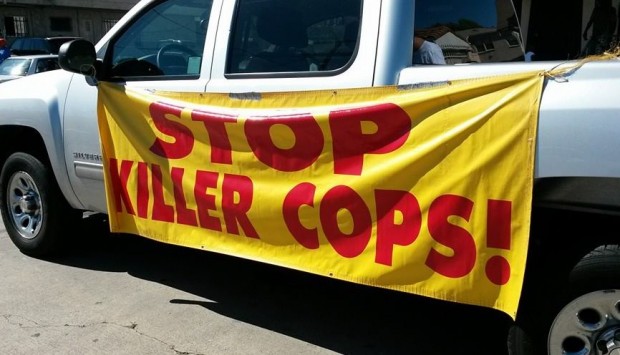 Considering how much conservatives started crying about Debo P. Adegbile being nominated to head the Civil Rights Division of the Dept. of Justice, he is going to be the best for the job in these times.
Considering how much conservatives started crying about Debo P. Adegbile being nominated to head the Civil Rights Division of the Dept. of Justice, he is going to be the best for the job in these times.
Daily Kos
Like a pack of slavering Baskerville hounds, the card-carrying members of “RRR” (acronym meaning varies—rabid Republican racists, religiously race-baiting right-wingers, reactionary racist Repubs, right-wing racist rhetoricians, or your choice) are on the scent of their new meme of “racialism” and their target is one of President Barack Obama’s nominee’s—Debo Adegbile.
Adegbile was nominated to head-up the Civil Rights Division of the Department of Justice.
Seems like there is a logic to selecting a lawyer to head up a civil rights division who has actual experience with (gasp) civil rights litigation. Adegbile has it.
Debo P. Adegbile is Senior Counsel to the United States Senate Judiciary Committee, a position he has held since July 2013. Previously, from 2001 to 2013, Mr. Adegbile held a number of roles at the NAACP Legal Defense and Educational Fund, Inc., including Special Counsel, Acting President and Director-Counsel, Associate Director-Counsel and Director of Litigation, Associate Director of Litigation, and Assistant Counsel.
The Leadership Conference on Civil and Human Rights, has issued a strong endorsement:
Debo Adegbile is one of the preeminent civil rights litigators of his generation and a bipartisan consensus builder. His experience as the two-time defender of the Voting Rights Act in the Supreme Court puts him in a class of his own when it comes to understanding the application and enforcement of complex civil rights issues. Add that to his stellar career over ten years at the nation’s leading civil rights law firm—the NAACP Legal Defense and Educational Fund—as well as his work in the Senate and in the private sector, and it becomes clear that Adegbile’s skill set, talents, and experience make him the perfect choice to head the Civil Rights Division.
Adegbile’s life mirrors that of the American Dream. A son of immigrants from Ireland and Nigeria, Adegbile grew up in poverty with periods of homelessness to work his way through law school and one day defend American democracy in the Supreme Court.
Millions of Americans rely on the Civil Rights Division to enforce housing, education, and employment discrimination laws, hate crime laws, the Violence Against Women Act, the Americans with Disabilities Act, and the core civil rights statutes that allow all of us to take part in the fullness of American life. Debo Adegbile is the right nominee to head the Civil Rights Division. We call on the Senate to swiftly confirm him.
The problem for RRR’s is that Adegbile is black. Worse—from their perspective—he is black and a veteran of the NAACP Legal Defense Fund (who they see as anti-white), and from a birtherist nativist xenophobic perspective clearly not “Amurrican” enough.
There’s that surname of his—Adegbile, which is Nigerian, from his father. And he’s the son of parents who, according to Richard Cohen, are probably causing a lot of gagging, since his mom is Irish.
Follow me below the fold for a journey into RRR reactionary land.
Just a few examples from the sewers:
National Review Online: The DOJ’s Radical Civil Rights Division; Obama’s pick to helm the division seems to hew to a racialist view of civil rights.
From comments:
u.s is turning into planet of the apes
From comments:
Shocking animal ooga booga’s promoting other animal ooga booga’s.
Thought Tom Perez was Radical? Meet Debo Adegbile:
But in the Obama Justice Department, the law is not as important as the cause. And with Adegbile, the cause is racialist.
We are already aware of the animus against Barack Obama’s paternity, and the Kenyan father he never knew, along with the birther conspiracy theory about his nativity. So many of the racist depictions of him as an ape, simian-like, or a savage with a bone in his nose, are deeply rooted in ideations about the Dark Continent, used to maintain slavery and white supremacy.
There have been numerous studies that prove having a non-WASP name affects getting hired, an interview for a job, or entry to a specific college or university. Of course, historically that was true for names that sounded Irish or Jewish. I was fortunate to have the surname Oliver, though after marrying and becoming a hyphenated Velez, slurs of “sp*c”, have increased.
Adegbile faces a formidable array of rationales for the vituperation unleashed against him. Bad enough to be black in America, a child of a mixed race union, and to have a clearly African first and surname, coupled with the hated resume of tenure with the NAACP, and his support of voting rights.
He expressed that support clearly in an interview done at NYU when he was chosen as Alumnus of the Month for July 2010.
Q: You also were involved in voting rights cases with the LDF during the 2000 presidential election and in the aftermath of Hurricane Katrina in New Orleans. What draws you to these kinds of cases?
A. Voting rights fascinated me when I studied the topic in my constitutional law class with Professor Christopher L. Eisgruber. Leaders like Martin Luther King and Thurgood Marshall knew that individuals’ ability to express their political voices was essential to take down the racial caste system of Jim Crow. So many of the civil rights leaders understood that having a vote—having an ability to pick leaders and to have a full measure of citizenship—was essential to ensuring equality, not just in the moment but in the future. That lesson was not lost on me.
Q: How did you develop an interest and expertise in voting rights law?
When I studied at NYU, I had a chance to take a couple of wonderful classes on race and the law in the United States and South Africa with the late, great A. Leon Higginbotham, Jr., and later I practiced with him at the Paul, Weiss law firm. He was the former Chief Judge of the Third Circuit Court of Appeals. He spent his career wo
rking as a civil rights lawyer and a federal judge, and was a passionate and unyielding voice for equality in the United States. He was very involved in a number of voting cases and was very passionate in defending the voting rights of African Americans, especially in the twilight of his career. I got to work with him as a summer associate and then as an associate at Paul, Weiss, and through that experience I participated in my first case with the LDF. So that experience set me on a path of not only caring deeply about these issues, but having an opportunity to become involved in the continuing struggle for equality.
Adegbile was exposed very early in life to concepts of justice and equality. He is an alumnus of Manhattan Country School, and sits on their board of directors. The school’s mission statement reflects the man he is:
In 1966, founders Gus and Marty Trowbridge set out to create an independent school where equality, social justice, a diverse community, and the inspiration of Martin Luther King, Jr. would form the basis for childrens’ education. Four decades later, at a school with no racial majority, that dream has become a vibrant reality for nearly 200 students every year.
Of course his childhood association with Big Bird may not win him any applause on the right either 😉
A: I auditioned for Sesame Street during the first or second season the show was on the air. A big “cattle call” went out in New York City because they were looking for more kids. Off to the audition I went, and I guess I made it through without wrecking the set or acting too unruly. I filmed episodes for nine years.
At NYU, I distinctly remember taking a workshop from placement services early in my time at NYU. Their advice was to take anything you’ve done that’s interesting or different and put it on your résumé, because law firms get a lot of résumés and after a while they all start to look alike. On the strength of that advice, I put Sesame Street on my résumé. And true to form, in almost every interview, it was a substantial part of the focus. I guess that talking about the show was a lot more interesting than my views on the law or my command of legal topics – I suspect that is still the case. So in some way, I owe my career success to attending that workshop and heeding that advice.
The good news on his nomination and future confirmation is that given the rules change in the U.S. Senate, he may not be blocked. We should help make that happen.
For those of you planning to attend Netroots Nation in Detroit in 2014 and interested in hearing more from him, he is scheduled to be on a panel. Here’s hoping his bio posted on the NN website will have a new addition—Debo Adegbile, Assistant Attorney General for Civil Rights, Department of Justice.


More Stories
What happened to Jared Taylor?
Had a great time at the RNC (mostly because we’re nuts)!
All Out for April 23, Stone Mountain Georgia